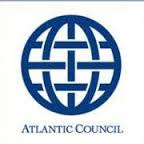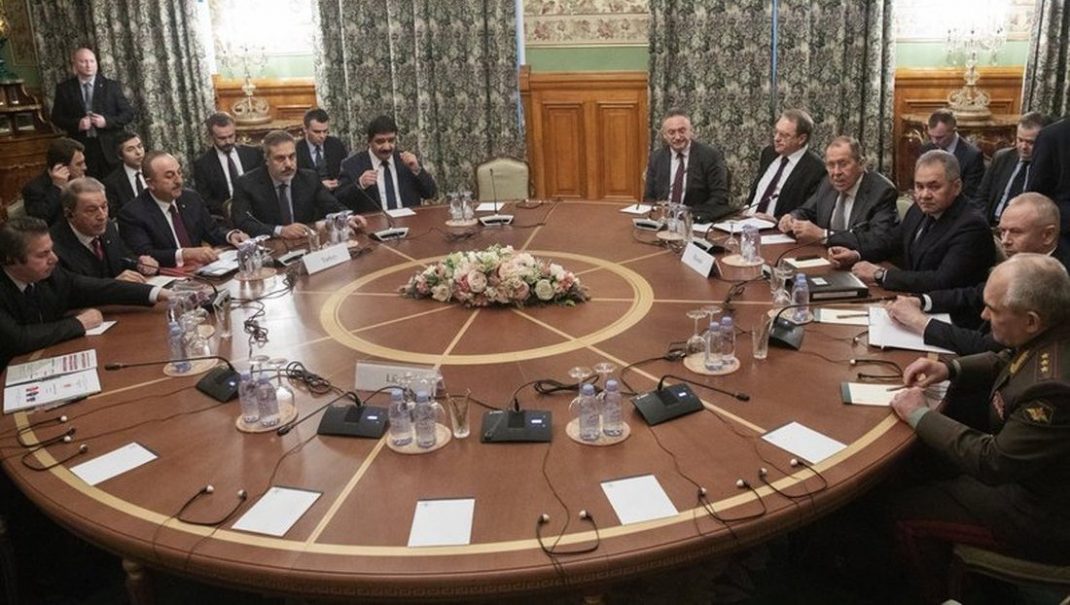By Karim Mezran & Emily Burchfield

 On April 4, 2019, troops led by Khalifa Haftar, a former general of Qaddafi who now contests the authority of the UN-sponsored Government of National Accord (GNA) seated in Tripoli, launched an attack against the Libyan capital.
On April 4, 2019, troops led by Khalifa Haftar, a former general of Qaddafi who now contests the authority of the UN-sponsored Government of National Accord (GNA) seated in Tripoli, launched an attack against the Libyan capital.
The real reasons for staging such an attack on that specific day are still unclear. It is hard to imagine that Haftar planned to attack the city precisely when UN Secretary General Antonio Guterres was visiting, he just did not care enough to halt the offensive.
In fact, the most widely accepted explanation points to the overwhelming ego of the general and his belief that he could quickly conquer the city.
He knew that he only had a small window of opportunity to reach his supreme goal, one he has stated since the beginning of his endeavors: to become the absolute leader of Libya.
To reach this objective, he had to conquer the capital before a National Conference, organized by the UN and the international community (including Haftar’s main sponsors Egypt and the UAE), could take place.
The result of the conference had been agreed to previously by all parties in Abu Dhabi and was supposed to include the appointment of Haftar as the head of the army, which constituted his major request up to that point, at least apparently.
In fact, the evolution of events on the ground showed that this was just a mask to obscure his much greater ambition.
Haftar’s attack was rejected by the militias of Tripoli and those of Misrata that came to assist in its defense.
It is clear that Haftar overestimated his political capital in Tripoli.
There was indeed a growing favorable position in Tripoli toward Haftar, mainly due to the shortcomings of the GNA led by Prime Minister Fayez al-Serraj.
The feeling of “better Haftar than the GNA” was undoubtedly increasing among the population. It is possible that Haftar did not realize that, unfortunately for him, the brutality of his attack changed the population’s opinion to “never Haftar,” even if they still disapproved of the GNA.
The attack and loss of popular opinion could have caused the collapse of Haftar’s campaign, but this outcome was avoided by the further intervention of Egypt, the UAE, and Russia on his behalf.
Air raids against the military, but also and mostly, the civilian infrastructure of Tripoli were conducted by planes and drones provided by Haftar’s backers.
Economic support from Saudi Arabia and the UAE allowed the general to buy more modern weapons as well as the services of Sudanese, Chadian, and Russian mercenaries.
A violent extremist military campaign was released against the civilian population of Tripoli in order to break resistance to Haftar’s ruling ambitions.
In response, Turkey increased its long-time support for the GNA: on January 2, 2020 the Turkish parliament approved a bill that would allow the deployment of troops to Libya.
Three days later Turkish President Recep Tayyip Erdoğan announced that the first Turkish military units had begun moving to Libya, where they will form a mixed air, land, and naval force.
Erdoğan claimed that the Turkish soldiers would not be fighting, but instead serving in training and coordinating roles, and that other forces—potentially Turkish-backed Syrian fighters—would be involved in combat.
Much remains to be seen in terms of the details of the Turkish deployment, but it is clear that this action will have an impact on the many international actors involved in Libya’s conflict.
The United Nations and the international community
The United Nations Support Mission in Libya (UNSMIL), whose mandate was established in 2011 and renewed in September 2018, is tasked with supporting an inclusive Libyan political process and pursuing peace, security, and economic dialogue through mediation.
Toward this end, the United Nations backed Serraj’s government in Tripoli. The vast majority of the international community has followed the UN’s example and recognized the GNA.
However, the UN-led political reconciliation process that established the GNA in December 2015 by an agreement in the Moroccan city of Skhirat—that has long been sidelined—keeping the GNA from being officially legitimized by Libya’s House of Representatives (HoR) in Tobruk.
In this context, General Haftar, backed by his self-styled Libyan National Army (LNA), has sought to delegitimize the GNA and assert himself as a new leader for Libya.
His ability to coalesce a range of militias throughout the country under the LNA umbrella stems in part from his claims to superiority in fighting ‘Islamists’, and in part from dissatisfaction among Libyans with the GNA’s performance.
His cause is further helped along by the interference of several foreign actors on his behalf, as well as the inaction of many who claim to support the opposing side.
The European Union
The European Union is the largest donor of humanitarian aid to Libya and claims to be the staunchest supporter of UNSMIL, but has been anything but united on which side to support in Libya.
The main rift is between France, which claims to support the GNA, but has been linked to military and financial support to Haftar; and Italy, which aligns with the United Nations in backing Serraj.
The clash between Italy and France over Libya has contributed to the failure of international efforts to develop a political solution for the conflict.
Even European Union (EU) countries that agree on who to support have failed to develop a coherent policy toward ending the conflict in Libya, focusing instead on issues important to European economic and security interests such as migration, border management, and hydrocarbons.
Without European leadership on Libya, Russia and Turkey have found it easier to insert themselves into the conflict.
The Turkish deployment to Libya was presaged by a maritime and military border agreement signed between Tripoli and Ankara in November, which EU leaders “unequivocally” sided with Cyprus and Greece in condemning as baseless and in violation of EU law.
The Turkish deployment could potentially unite the EU against a perceived common threat: European leaders (including both France and Italy) condemned Ankara’s move, and European leaders are expected to attend the delayed Berlin conference before the end of January to find a political solution to the conflict.
However, if a deal is reached between Russia and Turkey first, it will remove all EU leverage at the negotiating table and diminish the EU role in a political solution for Libya.
The United States
The United States has long seen the Libyan conflict as a European problem of little strategic importance for US interests.
In the absence of decisive European vote of confidence for the UN-backed GNA, the United States has remained mostly detached from the latest round of conflict, with the glaring exception of US President Donald J. Trump’s surprise phone call to Haftar after he launched his attack on Tripoli in April 2019, in which Trump “recognized Field Marshal Haftar’s significant role in fighting terrorism.”
US officials insist that the call was a personal favor to the Egyptian president, Abdul Fatah al-Sisi, and did not signify a shift in US policy. It is reported that not only Egypt, but also Saudi Arabia influenced the call.
Since then, the US administration has distanced itself from Haftar and Libya writ large, but the growing involvement of Turkey and Russia in the conflict may make that approach impossible.
Upon receiving news of Turkey’s planned deployment, President Trump warned President Erdogan that foreign influence was “complicating” the situation in Libya and stressed the importance of diplomacy.
Egypt and the United Arab Emirates
Egypt and the United Arab Emirates (UAE) have long supported Haftar’s military campaign to rid the country of “Islamist” groups they see as synonymous with the Muslim Brotherhood and therefore a threat to their interests and visions for the region.
They are further motivated by Qatar’s and Turkey’s support for Serraj, as the ongoing Gulf crisis manifests itself in proxy competitions in Libya and beyond.
Saudi Arabia backs Haftar for similar reasons to Egypt and the UAE, though so far its support has been political and financial rather than military.
The UAE and Egypt, on the other hand, provided extensive military assistance to Haftar’s forces; first in their assault on Benghazi and again in their attack on Tripoli.
While Egypt and the UAE previously recognized the GNA as the sole legitimate government of Libya, their actions have consistently undermined Serraj’s government and hindered opportunities for a political settlement.
Turkey and Qatar
As aforementioned, Libya has been one of the battlefields where the Gulf crisis has played out, and seen Turkey and Qatar backing opposite sides from Egypt, the UAE, and Saudi Arabia.
Ankara and Doha both back Serraj, and have reportedly provided military and financial assistance to GNA-aligned militias in Tripoli.
Qatar’s emir last month vowed to support the GNA in security and economic fields, and Turkey’s assistance to Serraj’s side has been well-documented.
Ankara reportedly sold $350 million worth of military equipment to allied militias in the wake of Haftar’s assault on Tripoli, and has ramped up its involvement by sending armed drones, seasoned fighters from its allied militias in Syria, and military advisers in support of the GNA.
The planned troop deployment demonstrates Turkey’s commitment to playing a leading role in the Libyan conflict and its resolution, and will undoubtedly factor into the calculations of both Ankara’s allies and rivals.
Russia
Russia has meddled in Libya for years, though not to the same degree as European or Arab states. Russia has provided Haftar’s side with economic support, printing Libyan dinars for the Central Bank of Eastern Libya—which is affiliated with Haftar’s supporters—since at least 2016, as well as considerable military assistance.
The Wagner Group, a military contractor operating with intelligence support and, unofficially, commands from Moscow, has operated in Libya for years, sending some 300 mercenaries to fight alongside LNA forces in Benghazi and later Tripoli.
Recent reports indicate that two more Russian firms have joined the Wagner Group in supplying Haftar with mercenaries, and that Russian-aligned Syrian fighters have arrived in Libya at Moscow’s bidding as well.
Russia has also introduced Sukhoi jets, coordinated missile strikes, and precision-guided artillery to the Libyan conflict. Russian interests in Libya are part of a larger strategy for the Middle East and North Africa that involves:
(a) Delegitimizing America and Europe in the region,
(b) Monitoring NATO’s southern front, and
(c) Gaining access to the Mediterranean region, with all its natural resources and strategic benefits.
With Turkey’s escalation in Libya, it will be important to watch Russia’s next moves and keep in mind broader Turkey-Russia relations.
Why all negotiations have failed
The recent escalation in Libya demonstrates why the mantra continuously repeated by most international actors, “there is no military solution, only a political one,” makes no sense at this point in time.
The military situation on the ground has to be settled before a political solution can be entertained. To obtain a real negotiation, a situation of parity or a “mutually hurting stalemate” has to be reached.
Disproportionate support in favor of Haftar, in flagrant violation of UN arms embargo, can only be offset by similar amounts of support for the GNA. That is what the Turkish assistance aims to provide.
Points to watch in the next few days and weeks
First, one should look for further details emerging about the level and kind of Turkish support.
Will the troops be there in an advisory or training role only, or will they support front line operations?
What is the size and scope of their mission? Will they keep to the stated one-year timeline?
One should also look into reported arrivals of Turkish-backed Syrian fighters and be wary of disinformation.
The second point to attend to is the Russian reaction. There have been reports from the front line of the disappearance of the Russian mercenaries, however, this cannot be possible.
Moscow’s actions in the next few days will have to be monitored closely. If they do not withdraw their forces, or even increase their involvement, it could mean that Moscow will pursue a negotiated settlement with Ankara and will maintain the leverage needed to do so.
On January 8, Presidents Putin and Erdogan met and called on all warring parties to declare a ceasefire on January 12. It is possible that Russia and Turkey will use the new dynamic between them to assert themselves as the power brokers in yet another conflict, a venue to flex both their military and diplomatic muscle.
A third point to watch is the reaction of Egypt and the UAE.
Will they increase their involvement, as President Abdel Fattah al-Sisi has claimed in recent days, or will they stay out of the escalation?
The fourth point is the reaction of the various militias in Tripoli to the Turkish deployment, whether they will welcome the Turkish deployment or not, and whether they will pay any attention to the Russian-Turkish call for ceasefire.
Fifth, Haftar’s response should be watched. The timing of LNA-aligned militias’ offensive to capture the coastal city of Sirte cannot be coincidental.
Another point to consider, at least in the short term, is the irrelevance of the European Union and the various European powers in determining the outcome of this escalation, which will likely be demonstrated at the forthcoming Berlin conference, if it materializes.
***
Karim Mezran is a resident senior fellow at the Atlantic Council’s Rafik Hariri Center for the Middle East.
Emily Burchfield is an assistant director at the Atlantic Council’s Middle East Programs.
___________





